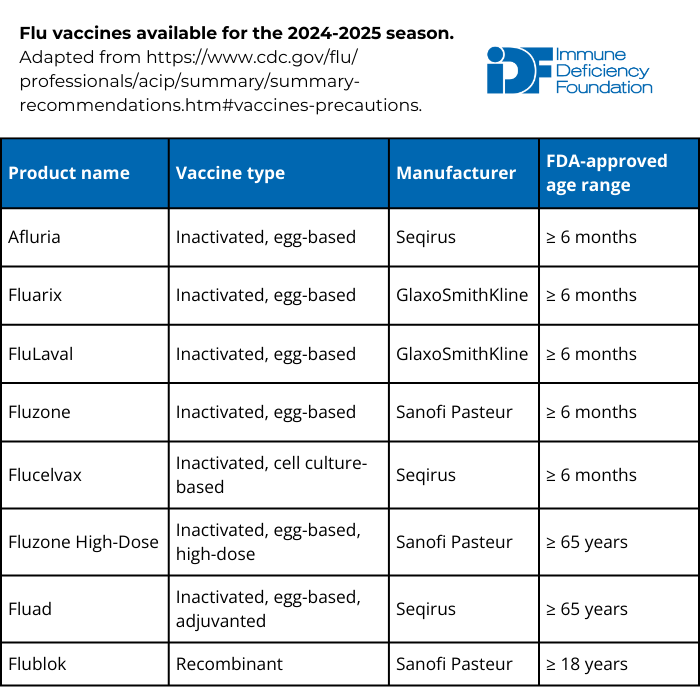

What is the flu?
Influenza, commonly known as "the flu," is a respiratory disease that usually comes on suddenly, with symptoms that vary from person to person. These symptoms may include aching muscles, sore throat, a dry cough, a runny or stuffy nose, fatigue, headache, a burning sensation in the chest, eye pain, sensitivity to light, and fever and/or chills (note that people with primary immunodeficiency (PI) may not spike a fever).
Although many people think of the flu as harmless, from 2010-2020, the U.S. Centers for Disease Control and Prevention (CDC) estimates that between 12,000-52,000 people died of flu-related complications each year.
Colds, COVID-19, and the flu have overlapping symptoms but are different respiratory illnesses with different treatments, so it’s important to be tested if you feel sick. Note that it is also possible to get multiple respiratory illnesses at the same time.
Does PI put you at high risk for flu complications?
Except for those with interferon pathway deficiencies, people with PI, also known as inborn errors of immunity (IEI), are not necessarily at higher risk of developing complications from the flu unless they meet other high-risk criteria, such as:
- Being 5 years old or younger (especially younger than 2 years old).
- Being 65 years old or older.
- Have asthma, diabetes, or chronic lung, heart, kidney, liver, metabolic, or blood conditions, including conditions that may be complications of PI.
- Have had a stroke.
- Have a secondary immunodeficiency caused by disease (e.g., HIV or blood cancer) or medication (e.g., immunosuppressive therapy).
- Are pregnant.
The flu's most common complication is bacterial pneumonia, with other complications including viral pneumonia, myocarditis (inflammation of the heart muscle), and worsening of lung diseases. See a healthcare provider right away if you have:
- Difficulty breathing, shortness of breath, or rapid, shallow breathing.
- Blue-ish lips or nail beds.
- Rapid pulse.
- Chest or abdomen pain or pressure.
- Seizures.
- Signs of dehydration (not passing urine).
- A persistent cough, especially if you’re coughing up colored phlegm or mucus (yellow/green).
- Severe muscle pain, weakness, or unsteadiness.
Reye's syndrome is another flu complication that primarily affects children and causes severe vomiting and confusion. To decrease the chance of developing Reye’s syndrome, infants, children, and teenagers should not be given aspirin for fever reduction or pain relief.
What causes the flu and how does it spread?
The flu is caused by influenza viruses. The two main types that infect people, influenza A and influenza B, are genetically different. Influenza A can cause moderate to severe illness in all age groups and infects many species, including pigs, birds, and horses. Influenza B usually causes milder disease and primarily affects children. Both influenza A and influenza B strains cause seasonal outbreaks, typically during the fall and winter months in the U.S. Visit the CDC for this year’s flu season report.
Influenza A strains can also cause flu pandemics, like the 1918 flu and the swine flu in 2009. Pandemics happen when a new influenza A subtype, typically from animals, spreads in human populations that have not ‘seen’ the subtype before and have no immunity to it. Pandemic strains typically go on to become seasonal strains once the human population develops some immunity to them.
Influenza spreads through tiny airborne droplets created by coughing, sneezing, or talking, which can be inhaled or land on mucus membranes in the nose, mouth, or eyes. The flu can also be transmitted orally by kissing or by touching a surface contaminated with the virus and then touching your face. People with PI are equally at risk of contracting the flu as those without PI.
People with the flu are most contagious 1-2 days before symptoms appear and for 4-5 days after. The flu's incubation period is 1-4 days. While most people recover in a few days, some experience severe illness.
What to do if you get the flu
People with PI should discuss plans with their healthcare provider about dealing with the flu before the season begins, including:
- How and where will you get tested for influenza or other, similar respiratory viruses like COVID-19?
- What antiviral medication does your healthcare provider recommend and how will you get it?
- What symptoms should you pay particular attention to?
In case of illness, those with PI should immediately contact their healthcare provider to get tested for influenza and start antiviral treatment, which is most effective within 48 hours of symptoms appearing.
There are several FDA-authorized or approved at-home antigen tests designed to detect influenza A and B, as well as SARS-CoV-2 (the virus that causes COVID-19). Note that antigen tests vary in accuracy and can give 'false negative' results, which means the test may not detect the virus even if you do have the flu or COVID-19. If you take an at-home test and it is negative, follow the manufacturer's instructions for retesting and consider getting a more sensitive PCR test (sometimes called a NAAT or molecular test). These tests are typically available at pharmacies, urgent care centers, and healthcare provider offices.
COVID-19 and PI
Learn more about COVID-19, how to protect yourself, and what to do if you get sick.

Latest infectious disease resources
This page contains general medical and/or legal information that cannot be applied safely to any individual case. Medical and/or legal knowledge and practice can change rapidly. Therefore, this page should not be used as a substitute for professional medical and/or legal advice. Additionally, links to other resources and websites are shared for informational purposes only and should not be considered an endorsement by the Immune Deficiency Foundation.
Sign up for updates from IDF
Receive news and helpful resources to your cell phone or inbox. You can change or cancel your subscription at any time.













